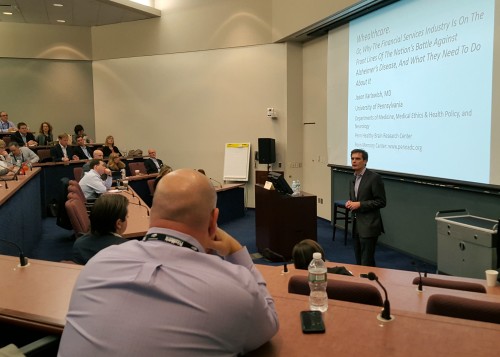Bankers and financial analysts are the “front lines” of screening and detection of cognitive impairment, and their industries need to catch up before a growing problem becomes uncontrollable.
“The banking and financial services industry of today that fails to address this problem will not be around tomorrow,” Penn Memory Center Co-Director Dr. Jason Karlawish said Monday at the 2016 Securities Industry Institute at The Wharton School. “It’s time to rethink your business model.”
Most of the private wealth in the United States is held by adults ages 65 and older, the segment of the population most at-risk for developing clinically significant cognitive problems, Karlawish said. And since money management is one of the first abilities diminished by cognitive impairment, financial advisors are well positioned to detect changes in their clients’ cognitive status, he said.
“You’re managing not just wealth, but whether you like it or not, you’re managing health as well,” Karlawish said.
Karlawish told the story of Renee Packel, a Philadelphia resident whose husband had stopped paying their homeowner’s association fees or his creditors. Arthur Packel had Alzheimer’s disease, they learned, and his financial mistakes cost them their planned retirement. His business was sold, and she went back to work as a receptionist in her 70s. Dreams of trips to Paris were dashed.
Financial planners have a responsibility to serve their clients using data, technology and intuition that can identify the red flags before clients ruin themselves financially, he said. And as Baby Boomers become older adults, they are greatly outnumbering the younger people available to help them.
When meeting with a physician at the Penn Memory Center, patients are required to be joined by an informant — a friend or family member who knows the patient well and sees him or her regularly enough to notice unusual changes. Karlawish recommended that financial planners have a similar system in place for their clients.
“Create a business model that creates some space between ‘buyer beware’ or ‘you bought it, you own it’ and power of attorney or ‘you’ve lost all of your abilities,’” Karlawish said. He also stressed that these companies need to educate and empower their employees to properly handle these cases, identifying those who do the best job of it.
Companies also need to use their “datasets of failing brains and transactions” to create systems that will allow them to hold up and report red flags, he said. Companies like EverSafe offer loved ones a chance to observe accounts without directly managing them.
